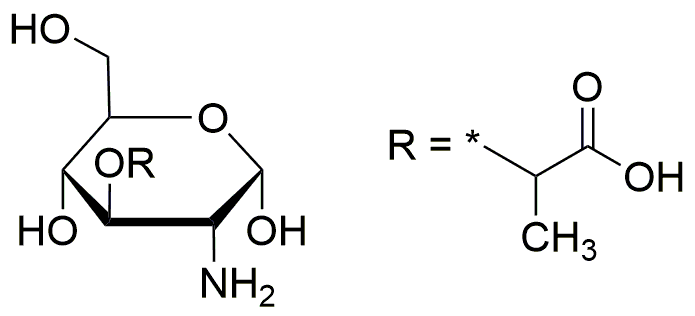Muramic acid is widely utilized in research focused on:
- Antibiotic Development: This compound plays a crucial role in the synthesis of peptidoglycan, a key component of bacterial cell walls, making it a target for developing new antibiotics that can combat resistant bacterial strains.
- Biochemical Research: Researchers use muramic acid to study bacterial metabolism and cell wall biosynthesis, providing insights into fundamental biological processes that can lead to advancements in microbiology.
- Food Industry: In food science, muramic acid is explored for its potential as a natural preservative, helping to inhibit the growth of spoilage bacteria and extending the shelf life of products.
- Immunology: The compound is being investigated for its role in immune responses, particularly in how it can influence the behavior of immune cells, which could lead to new therapies for autoimmune diseases.
- Pharmaceutical Formulations: Muramic acid is studied for its potential applications in drug delivery systems, where its properties can be harnessed to improve the efficacy and targeting of therapeutic agents.
General Information
Properties
Safety and Regulations
Applications
Muramic acid is widely utilized in research focused on:
- Antibiotic Development: This compound plays a crucial role in the synthesis of peptidoglycan, a key component of bacterial cell walls, making it a target for developing new antibiotics that can combat resistant bacterial strains.
- Biochemical Research: Researchers use muramic acid to study bacterial metabolism and cell wall biosynthesis, providing insights into fundamental biological processes that can lead to advancements in microbiology.
- Food Industry: In food science, muramic acid is explored for its potential as a natural preservative, helping to inhibit the growth of spoilage bacteria and extending the shelf life of products.
- Immunology: The compound is being investigated for its role in immune responses, particularly in how it can influence the behavior of immune cells, which could lead to new therapies for autoimmune diseases.
- Pharmaceutical Formulations: Muramic acid is studied for its potential applications in drug delivery systems, where its properties can be harnessed to improve the efficacy and targeting of therapeutic agents.
Documents
Safety Data Sheets (SDS)
The SDS provides comprehensive safety information on handling, storage, and disposal of the product.
Product Specification (PS)
The PS provides a comprehensive breakdown of the product’s properties, including chemical composition, physical state, purity, and storage requirements. It also details acceptable quality ranges and the product's intended applications.
Certificates of Analysis (COA)
Search for Certificates of Analysis (COA) by entering the products Lot Number. Lot and Batch Numbers can be found on a product’s label following the words ‘Lot’ or ‘Batch’.
*Catalog Number
*Lot Number
Certificates Of Origin (COO)
This COO confirms the country where the product was manufactured, and also details the materials and components used in it and whether it is derived from natural, synthetic, or other specific sources. This certificate may be required for customs, trade, and regulatory compliance.
*Catalog Number
*Lot Number
Safety Data Sheets (SDS)
The SDS provides comprehensive safety information on handling, storage, and disposal of the product.
DownloadProduct Specification (PS)
The PS provides a comprehensive breakdown of the product’s properties, including chemical composition, physical state, purity, and storage requirements. It also details acceptable quality ranges and the product's intended applications.
DownloadCertificates of Analysis (COA)
Search for Certificates of Analysis (COA) by entering the products Lot Number. Lot and Batch Numbers can be found on a product’s label following the words ‘Lot’ or ‘Batch’.
*Catalog Number
*Lot Number
Certificates Of Origin (COO)
This COO confirms the country where the product was manufactured, and also details the materials and components used in it and whether it is derived from natural, synthetic, or other specific sources. This certificate may be required for customs, trade, and regulatory compliance.


